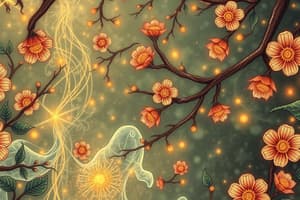Podcast
Questions and Answers
During arousal, the ______ nervous system is activated, preparing the body for action.
During arousal, the ______ nervous system is activated, preparing the body for action.
sympathetic
[Blank] such as dopamine, act within the synapse to transmit signals between neurons.
[Blank] such as dopamine, act within the synapse to transmit signals between neurons.
neurotransmitters
Working for money to purchase something you want is an example of ______ motivation.
Working for money to purchase something you want is an example of ______ motivation.
extrinsic
Unlike neurotransmitters, ______ use the bloodstream as their method of transport throughout the body.
Unlike neurotransmitters, ______ use the bloodstream as their method of transport throughout the body.
High levels of ______ are typically associated with feelings of hunger, signaling that the body needs nourishment.
High levels of ______ are typically associated with feelings of hunger, signaling that the body needs nourishment.
The ______, a midbrain structure, plays a critical role in processing and responding to fear.
The ______, a midbrain structure, plays a critical role in processing and responding to fear.
A lesion to the ______ hypothalamus is likely to lead to increased hunger and food consumption.
A lesion to the ______ hypothalamus is likely to lead to increased hunger and food consumption.
In higher-order conditioning, the conditioned stimulus (CS) begins to function as a ______ to establish new associations.
In higher-order conditioning, the conditioned stimulus (CS) begins to function as a ______ to establish new associations.
Classical conditioning can result in ______ generalization, where a learned response extends to stimuli similar to the conditioned stimulus.
Classical conditioning can result in ______ generalization, where a learned response extends to stimuli similar to the conditioned stimulus.
According to Hull's drive theory, behavior is a product of drive, habit, and incentive, summarized by the formula: D x H x ______.
According to Hull's drive theory, behavior is a product of drive, habit, and incentive, summarized by the formula: D x H x ______.
Flashcards
Arousal and the Nervous System
Arousal and the Nervous System
The nervous system activated during arousal.
Neurotransmitters
Neurotransmitters
Chemical messengers that transmit signals across a synapse.
Pavlovian Conditioning
Pavlovian Conditioning
A learning procedure in which a biologically potent stimulus (e.g. food) is paired with a previously neutral stimulus (e.g. a bell).
Extrinsic Motivation
Extrinsic Motivation
Signup and view all the flashcards
Intrinsic Motivation
Intrinsic Motivation
Signup and view all the flashcards
Neurohormones
Neurohormones
Signup and view all the flashcards
Dopamine
Dopamine
Signup and view all the flashcards
Ghrelin
Ghrelin
Signup and view all the flashcards
Amygdala
Amygdala
Signup and view all the flashcards
Midbrain's Role
Midbrain's Role
Signup and view all the flashcards
Study Notes
- High testosterone levels in Griffin altered cognitive processes and desires.
- The synthetic nervous system is activated during arousal.
- Neurotransmitters facilitate communication at the synapse.
- Pavlovian conditioning is synonymous with classical conditioning.
- Working for monetary compensation to purchase something, like chicken wings, exemplifies extrinsic motivation.
- Intrinsic motivation arises from internal factors.
- Neurohormones are transported throughout the body via the bloodstream.
- Dopamine is the neurotransmitter active in the midbrain's dopaminergic system.
- Elevated ghrelin levels are associated with feelings of hunger.
- The amygdala, a midbrain structure, is linked to the fear response.
- Lesioning the ventromedial hypothalamus may lead to increased hunger.
- Boosting self-esteem does not necessarily increase motivation.
- In classical conditioning, the conditioned response is a learned response.
Brain Structure and Function
- The most fundamental life functions, such as breathing and heart rate, are regulated by the hindbrain.
- Frontal Lobe Function: Decision-making and problem-solving occur in the frontal lobe.
- Parietal Lobe Function: Sensory processing and spatial awareness occurs in the parietal lobe.
- Temporal Lobe Function: Hearing and memory are functions of the temporal lobe.
- Occipital Lobe Function: Vision is processed in the Occipital lobe.
- Hindbrain
- Midbrain
- Forebrain
Classical Conditioning Concepts
- In higher-order conditioning, the conditioned stimulus (CS) starts acting as an unconditioned stimulus (US) to chain additional CS.
- Evaluative conditioning replaces a US with a new US that produces an opposite unconditioned response (UR).
- Little Albert's fear of a fur coat demonstrated generalization from the conditioned stimulus (CS).
- Perfume often serves as an example of a conditioned stimulus in learning scenarios.
- Unconditioned means unlearned.
- Being afraid of all bugs after being bitten by a spider illustrates stimulus generalization.
- An unconditioned stimulus elicits a response before any learning takes place.
- The conditioned response (CR) is a learned response in classical conditioning.
- When a CS is presented alone and the CR diminishes, it is called extinction.
- Sudden reappearance of a CR after a period of extinction is known as spontaneous recovery.
- In the context of food poisoning through classical conditioning:
- US: Contaminated food
- UR: Nausea and vomiting
- CS: Sight or smell of that food
- CR: Nausea upon re-encountering that food
Motivation and Emotion
- Internal motives are categorized into needs, cognitions, and emotions.
- Motivation involves the study of internal processes and external behaviour.
Hormones and the Nervous System
- Oxytocin functions as a bonding hormone.
- Activation of the sympathetic nervous system results in pupil dilation and vasoconstriction.
Research and Measurement
- An operational definition transforms an abstract concept into something objective.
- A platykurtic response curve across multiple conditioned stimuli is termed generalization gradient flattening.
- Galvanic skin response is a psychological measurement of motivation.
Theories of Motivation
- Hull's drive theory formula is D x H x K.
Compensatory Drug Response Graph
- [This requires more information regarding the features or data within the graph]
Hierarchy of Motivation
- [This requires more information regarding the features or data within the hierarchy]
Studying That Suits You
Use AI to generate personalized quizzes and flashcards to suit your learning preferences.




